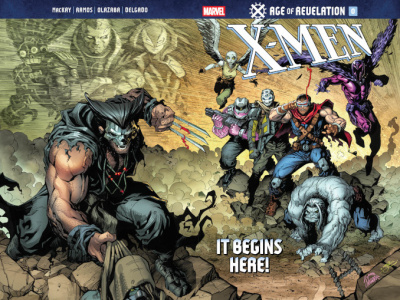James Meeley, assistant manager of Ron's Coin & Collectibles in Yakima, Washington, saw the column by Steve Bennett on 86ing the 32-page comic format (see 'Confessions of a Comic Book Guy--Resolved: Comic Books Should Be More Expensive'), and disagrees:
I just read Steve Bennett's latest piece about how comics should dump the 32-page magazine format. This is a topic that always seems to come up at points in time, especially when there's another price increase on monthly comics. And while Bennett's 'numbers' seem to make his theory a foregone conclusion, I don't think it's quite as cut and dried as he does.
His use of Disney Adventures Comic Zone and Shonen Jump, to start with, are hardly a fair comparison. With their presence on newsstands and other outlets, which monthly comics are denied, racking up higher numbers doesn't seem like such a shocking feat.
Furthermore, he fails to take his own arguments of the past into account. Remember how 'mainstream comics' (specifically Marvel and DC's superheroes) have become much darker in their content, which places them out of the realm of 'all ages entertainment'? Well, Disney Adventures and Shonen Jump are both aimed directly at the mainstream/all-ages audience that Bennett says the classic superheroes no longer cater to. So, wouldn't comparing the numbers to each other be little more than apples to oranges? Yeah, both are fruits, but hardly interchangeable.
There is no denying that the 'classic' comic format is not as dominant as it once was. Collected trades continue to grow much faster than comic books. The market percentages are a lot closer today than they were just 5-10 years ago, and there looks to be no slowing of the trades' continued growth, while comic books seem to be struggling to continue their own upward momentum.
But does that equate to the format being obsolete? I don't think so. Do people still listen to the radio? Of course. Now, radio's day of being #1 might be over, as television and the Internet are much more dominant forms of getting entertainment and news, but radio hasn't just faded away into oblivion, because they are no longer the most popular form around.
It's no different for comics. Heck, I remember back in the 80s, when trades were first starting to make it to the marketplace, no one thought they'd last. They were way more expensive than comics. They sometimes would even cost more than the cover price of the comics they collected. This was something that lasted well into the 90s. Had the 'conventional wisdom' been followed then, trades would not be here today. But as things changed and the market evolved, trades found a niche and have continued to grow.
The classic comic book format might not ever reach the heights of its 'glory days' again, but that doesn't make it worthless. I often remind people who claim trades are so superior that the reason they can get the collected trade cheaper than all the comics it collects is due to folks who support the original comic format. By getting some money from that format, the companies are basically making the trades reprint material, which is much cheaper to produce than all-new material. So, they can charge less per issue-worth of material and make the trade a 'better value' and still make a nice profit. I see no reason why that can't remain the case, so long as the format is bringing in money.
I think there is room enough in the industry for both formats. Comic books will probably never again be the dominant format of their industry, but they will always have a place at the table for them.







